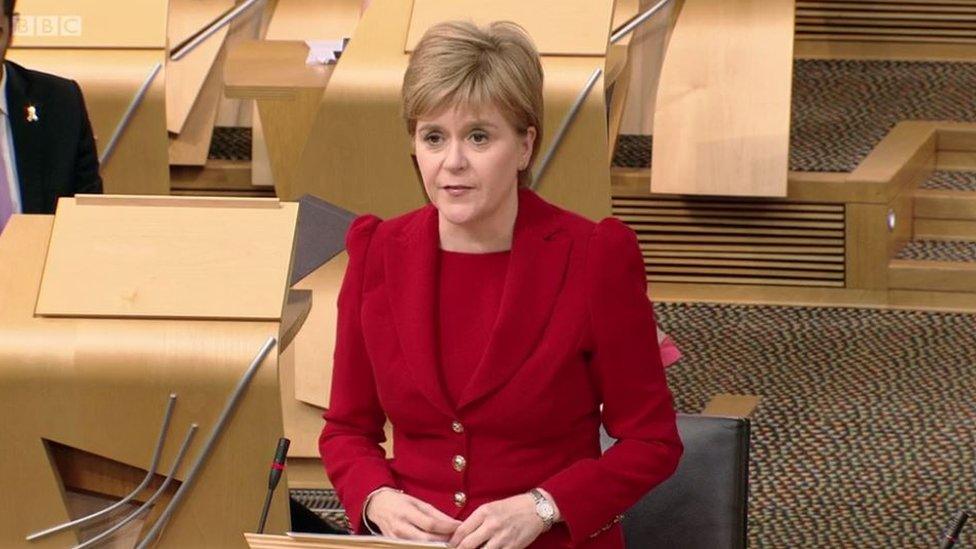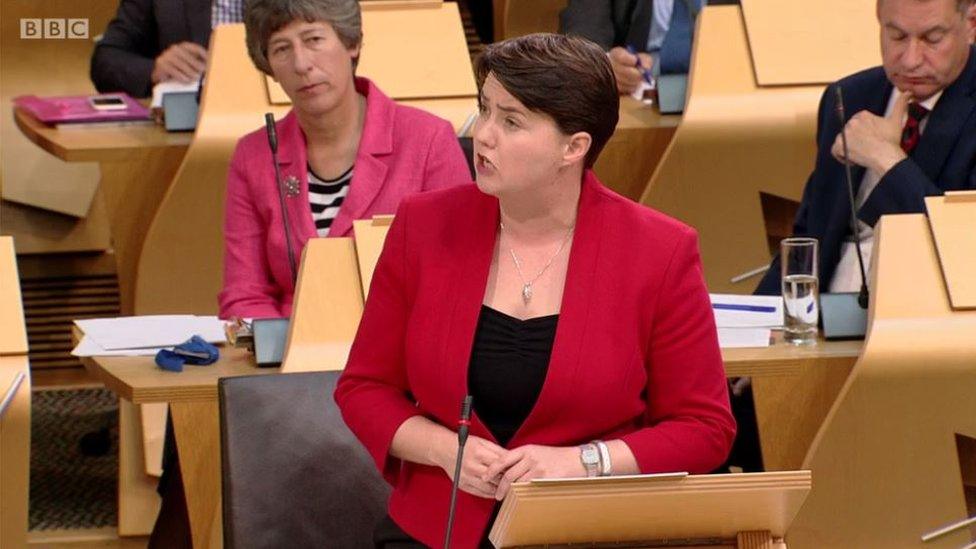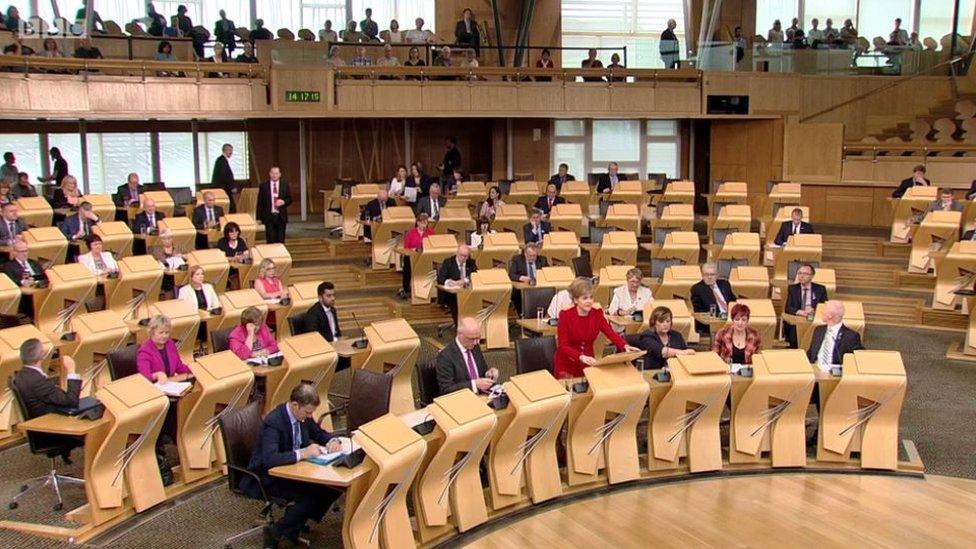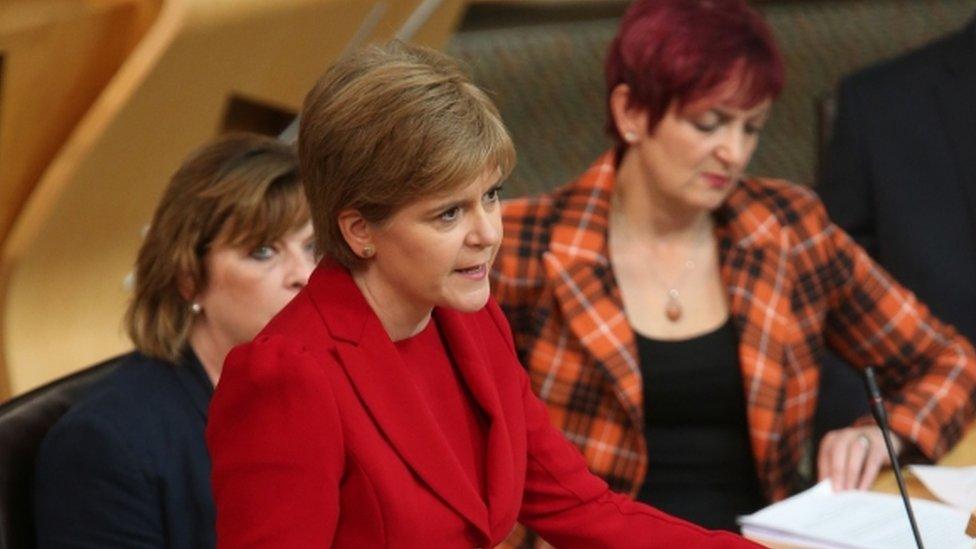Nicola Sturgeon's programme for troubled times
- Published

Ms Sturgeon made the economy and education her top priorities for government
It was, we were assured, a programme for different - and troubled - times. Hence a renewed emphasis on bolstering economic growth alongside the priority accorded to education.
Not, to be clear, that the economy has ever been far from ministers' minds. However, Nicola Sturgeon's narrative is that Brexit will add considerably to the challenges facing Scotland and the UK. Requiring additional support.
But, even in these post referendum days (EU, that is, not the 2014 version), there is still scope for a few familiar notes.
And so Ms Sturgeon lambasted the Tories, characterising them as the right-wing enemies of her social democratic programme. Ruth Davidson, who leads said rightist cabal, smiled benignly from her new elevated status as the principal opposition party, accusing Ms Sturgeon of preparing to hike Scottish tax by failing to pass on UK Treasury concessions to higher rate payers.
There was more to comfort those who like familiarity in politics. Labour's Kezia Dugdale, in an impassioned contribution, castigated the SNP for lacking the "ambition" to use Holyrood's new powers - which is, of course, code for adopting Labour's tax plans.
Patrick Harvie of the Greens suggested more urgency on climate change targets and criticised a planned cut in Air Passenger Duty as a sop to wealthy flyers.
And Willie Rennie of the Liberal Democrats complained that Ms Sturgeon had spent the summer bolstering the prospects for independence in the aftermath of the Brexit vote. Up with which he was disinclined to put.

Ms Sturgeon set herself up for a confrontation with the Tories, attacking them for being right-wing
On which point, a caveat. There was notably little about independence in this Programme for Government. (To be fair, Mr Rennie recognised that: his point was about the lead-up work.)
Yes, Ms Sturgeon confirmed that there would be preparatory work done - consultation and the like - to get ready a Referendum Bill (2014 revisited, that is, not EU), should developing circumstances argue for such a move.
But she insisted that the programme on the day, external was about the "nuts and bolts". The day job in short.
Distractions dismissed
Ms Sturgeon has always argued that she and her ministerial team were focused upon that day job. She has always dismissed the argument that they were distracted, post Brexit vote, by further thoughts of independence.
But her renewed and strenuous emphasis upon this fact would suggest, to this observer at least, that the FM suspects that the endlessly repeated opposition complaints on this point may be having an effect.
Now to economic growth. This, to be absolutely clear, is not a new focus for the FM. It was, indeed, the subject of her very first major speech after attaining the top office at Holyrood - when she assured a business audience that an egalitarian approach would be matched by an emphasis on bolstering the economy.
Business leaders liked the sound of that. But some fret that the action from Ministers does not always match the tenor of those promises. Most particularly, they want further intervention to prevent business rates in Scotland from presenting a significant hurdle.
They witness and applaud the small business rates bonus. But they are watching out with care and attention for the outcome of a review of business rates more generally, noted by Ms Sturgeon in her statement.

MSPs will get a chance to set out their own priorities for the coming term in a two-day debate
But, again, to confirm, Ms Sturgeon has prioritised the economy from the outset, arguing that it is only through productive development that one can find the cash for services.
She has now made two further interventions on this scheme. On Friday, she announced the creation of an SNP Growth Commission, to be headed by former MSP Andrew Wilson with other names to come.
I am assured that those other names will include SNP stalwarts who also believe that Scotland needs to prioritise economic growth alongside social cohesion.
Targeting growth
Further, today, she announced a Scottish Growth Scheme. This would be worth £500m which would be used to guarantee bank loans when companies have struggled to obtain finance. In certain circumstances, there could be direct lending. In all cases, companies would require to meet key criteria.
Once again, this focuses upon growth. But, as opposition parties are already commenting, it potentially contains a constitutional dimension.
These loan guarantees would not count as part of the Scottish government's discretionary current spending budget. If agreed, they would go on the books as Annually Managed Expenditure which generally covers such matters as continuing pension liabilities.
That would require sanction from two sources. One, MSPs would have to agree to give ministers control over these funding vehicles, avoiding individual companies having to face the invidious task of setting out their detailed balance sheets before a Holyrood committee.
But, secondly, the new scheme would require UK Treasury sanction. Ms Sturgeon fired the first shot by voicing the hope that there would be no objection from that quarter.
As I noted at the outset, some elements in governance remain consistent, despite substantial external changes.
- Published6 September 2016
